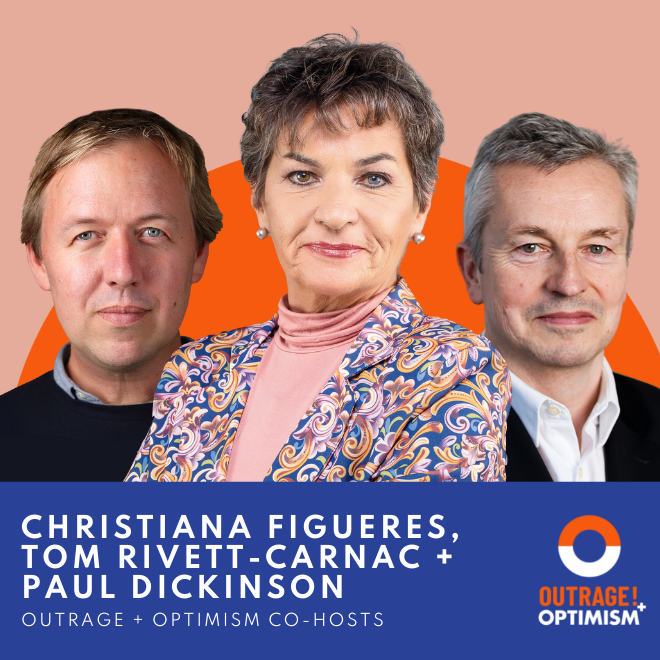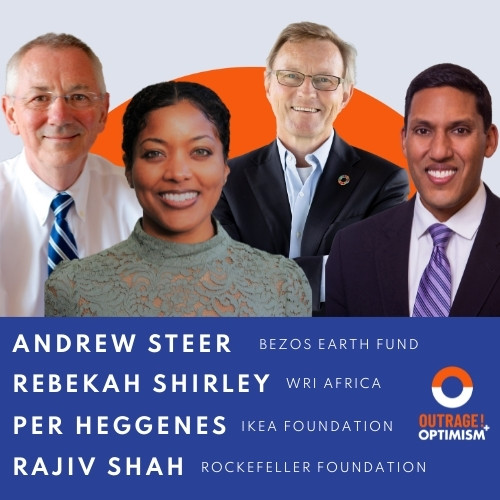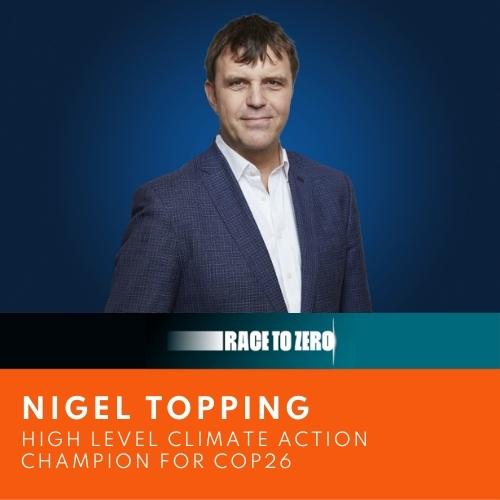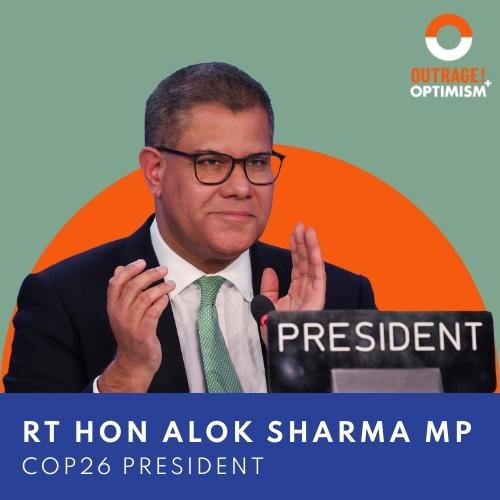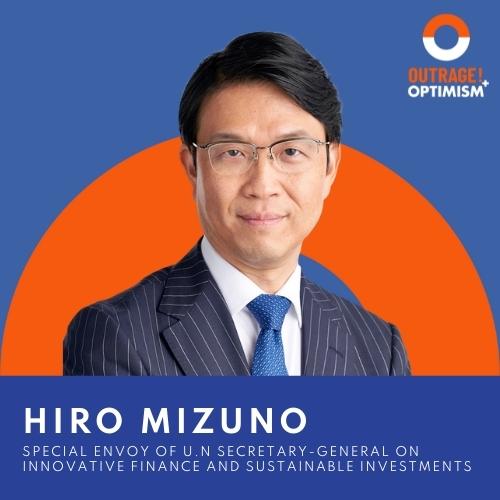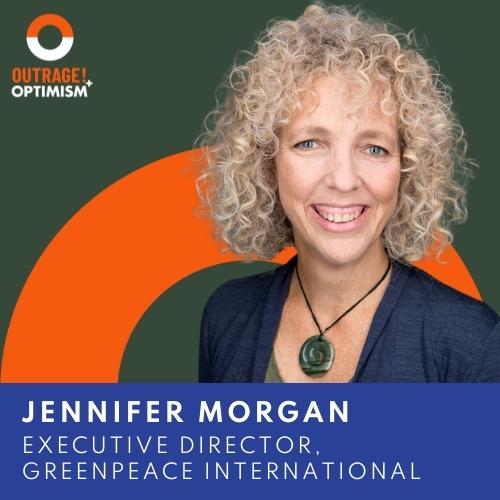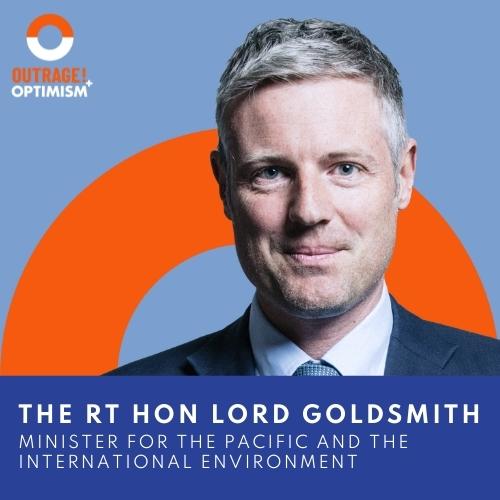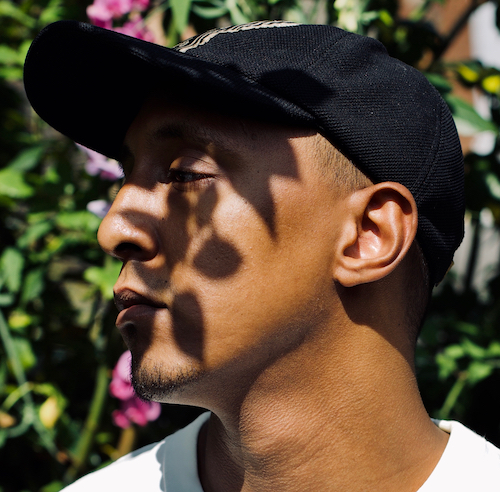130: Opening Hearts with Elizabeth Wathuti
With the ink still drying on The Glasgow Pact, we’re already hearing the results from Glasgow being labeled in binary terms like 'success' and 'failure'.
About this episode
With the ink still drying on The Glasgow Pact, we’re already hearing the results from Glasgow being labeled in binary terms like “success” and “failure”. While we know that some stunning pledges and progressive language in the Pact came from some of the negotiations, it is also true that historically these pledges have not been met completely, or have been missed entirely. Full stop.
So with millions of humans suffering under the systemic injustice of rising global emissions, how do we meet this moment to reduce those global emissions and break those unjust systems of oppression? And how does the COP process make those necessary changes politically possible? And in the next eight years?!
Maybe it’s as simple as starting with silence.
This week we speak with Elizabeth Wathuti, environmentalist and climate activist from Kenya. She is the founder and president of Green Generation Initiative, and Head of Campaigns and Daima Consortium Coordinator for the Wangari Maathai Foundation.
Elizabeth brought the house down at COP26 this year with her speech in which she led a moment of silence followed by the urgency to every Head of State in the room to “ please open your hearts”. You won’t want to miss what she has to say to us on the show!
Stick around ‘til the end for an incredible music track from Knomad Spock!
—
Mentioned links from the episode:
Read: Martin Wolf’s piece in The FT
Watch: Elizabeth Wathuti at COP26 “Please Open Your Hearts” Speech
Watch
Full Transcript
Transcript generated by AI. While we aim for accuracy, errors may still occur. Please refer to the episode’s audio for the definitive version
Tom: [00:00:12] Hello and welcome to Outrage + Optimism. I'm Tom Rivett-Carnac.
Christiana: [00:00:16] I'm Christiana Figueres
Paul: [00:00:18] And I'm Paul Dickinson.
Tom: [00:00:20] This week we talk about the road not yet taken at Cop Twenty Six and what we need to do to get us back on track. We speak to Elizabeth Wathuti, climate activist from Kenya, and we have music from Knomad Spock. Thanks for being here.
Tom: [00:00:37] So great to be here, everybody, and we were back, of course, two weeks ago and we gave you a bit of an update in terms of what we understood happened at COP26. And we're going to stay on that theme for the next few weeks. This is obviously the big event in climate of 2021, although of course there were many others, but we're going to spend a few weeks kind of unpacking it from different perspectives. And this week we want to really honor a name. The fact that there were hundreds of thousands of activists in Glasgow and around the world who were deeply frustrated with what came out of the negotiations and had a deep level of skepticism around the commitments and a sense that what was announced there cannot be trusted. And even if world leaders claim that we are now on a path to dealing with the worst of climate, actually those pledges are not yet of an order and of a certainty that can make us think that we have really gotten anywhere near where we need to go. So we're going to dig into this for a bit now. And then we have an incredible interview that we recorded earlier today with Elizabeth Wathuti, who spoke at the opening of COP26, and there's an incredible climate activist from Kenya.
Load MoreTom: [00:01:38] But I'd just like to start by naming the reality that Glasgow was a city of two tales. There were those on the inside who claim, we were making real progress, that we'd brought the emissions trajectory down from three point seven to two point four. But at the same time, what we saw both in the climate negotiations themselves and around the outside was a complete collapse of trust that those pledges, first of all, they don't go far enough. And secondly, they can't be trusted. Actually, we have a long history of national governments, of corporations, of collaborations in these multi-stakeholder commitments, saying one thing and then not delivering on it. And as a result of that, we need to now double down and ensure that we can be confident that what they've said will be delivered. So I'd like to just open the conversation there and invite an opening comment from both of you and then we'll dig into the discussion.
Paul: [00:02:43] I've had a very peculiar thing has happened to me. I've changed in my general outlook regarding these issues, I fundamentally changed.
Tom: [00:02:48] Ok. This is a big moment.
Paul: [00:02:50] Well, maybe not because I super trust you, Tom and you, Christiana, and I would invite you to correct me if you think I've got this wrong and I was kind of alluding to it a couple of times before, but I really am starting to really feel it now like I've really changed. Because. The key point now is emissions reductions at seven percent a year or something, 7.5 percent a year for the next 10 years. Now. You know that I don't think can be achieved now without laws being passed in many, many countries that specify increased taxation on fuels or specific regulation or reductions. And my point is that it feels that we've come to a point where I was trying to find a way to describe it. You know, it's a little bit different in Saudi Arabia or China or Russia, where they have pretty different political systems, but you know, the public everywhere alongside business and investors and civil society must just demand that legislators regulate or resign. That the parliamentarians regulate or resign. It is now time we just called out. Now is the moment, and you can argue it's always been like that. But I feel fundamentally now the legislatures are surrounded by the extreme weather, the youth striking the businesses, the investors, the civil society. We're all there now. The last domino must now fall. And I think what's practical about what I'm saying is that we need to be thinking much more about model legislation. We need to be having a super accelerated debate about what we're going to be implementing when, how and how quickly. And that was, yeah, that's my opening shot.
Christiana: [00:04:50] Ok. So I will take up your invitation of disagreeing with you, but only partially because my top level conclusion out of cop twenty six, in addition to everything that we've shared here on the podcast and everywhere else, is that these kinds of multilateral agreements or in the case of what you've just mentioned, Paul, national regulation or policy measures of any kind, do not guarantee success. They just don't. And conversely, the absence thereof, the absence of agreements or regulations or any other kind of legal structure does not impede progress. So yes, they're important. Yes, it's important to have ambitious agreements. Yeah, it is important to have regulation and incentives and everything else, but we just can't put all our eggs into that basket. We have to have everything in addition to. And I would be concerned if we rely exclusively on that just because of the timing. So my suggestion is we definitely encourage pressure for that. And in the meantime, we move forward, especially my heart today is much more in the forces of the market and that can be naive and can seem irresponsible, admittedly. But that's where I am today. The forces of the market, the competitiveness of cost, the fact that we now have alternatives that are far and large better than the alternatives that we had in the last century, I think is actually more, I think it's exactly the way that we're going to progress most. This morning I had a long conversation about green hydrogen and it struck me that for those who are still thinking baseload and peak load, the way the fossil fuel energy system was structured, we don't need to think that way anymore. And green hydrogen can offer storage. It can offer easy transport. It can offer the solution to intermittency. It is energy intensive. Hence, it can be the alternative to gas in industries such as cement, iron and steel, et cetera, et cetera, et cetera. So the fact is that we do have an advance of technologies and those prices are coming down, that I think is going to be much more wind in our back, which of course, if coupled with regulation and especially with carbon pricing will definitely move us forward. But don't we need everything on the table at this point when we just have eight years to go?
Tom: [00:08:14] So I think that's a really helpful opening here, and I would just ask you. You know, there are a lot of people who are in real grief right now by what they thought might happen at COP26 and didn't. And we talked two weeks ago for those who didn't listen, you know, around some of the outcomes around the multi-stakeholder commitments, how far the national commitments did go. The process to getting more commitments in a year's time. And and all of that, you know, we would say from the perspective of people who've been involved in international diplomacy marks real success. But it's also true that if you look at this from the perspective of what we need to achieve, it's still not enough. There's actually an op-ed that came out today from Martin Wolf in the Financial Times. He's very good. And he says if we compare the global discussion today with that of a decade ago, we've come a long way. But if we compare it with where we need to be, there's still a frighteningly long way to go. It's too soon to abandon hope, but to be complacent would be absurd. We need to act powerfully, credibly and quickly, and not least we must agree to do so together.
Christiana: [00:09:24] So we all agree we have made progress?
Tom: [00:09:27] We all agree with that. Absolutely. However, there are those who look at what came out of Glasgow and they say this is a betrayal. Actually, this is nowhere near enough. This is an agreement to agree. In a year's time, it didn't go far enough. It didn't guarantee us 1.5. This is a failure. And I just wonder what you would say to people like that because obviously there is an element of truth in that, for sure.
Christiana: [00:09:50] A huge element of truth.
Tom: [00:09:52] Yes, a huge element of truth. And like so many other things in climate, there is a broader picture. So I just love to hear your comment on that.
Christiana: [00:10:01] So my my sense from that perspective, Tom, my sense is that COP26 delivered from the mind or from the head, but didn't deliver from the heart, and what I mean by that is that we can put, you know, a long list, a long parade of numbers of, you know, tons and trillions of dollars and numbers of companies and numbers of countries and all of that. All of that is what I would call delivery from the head. And all of that is very good news. But we did not deliver from the heart in the sense that we were not sensitive enough to the deep pain and the misery that millions of people are already experiencing because of climate change. And we also didn't deliver from the heart because were we to truly be identified with that pain and that misery, we would act with much more urgency that would be the reaction that we would have to truly integrating the pain that is being felt. And so the fact that, yes, we had all kinds of alliances and you know, everything that we've discussed that comes that was put forward is great and is definitely a step forward. But compared, as Martin Wolf says, compared to where we should be, compared, honestly, to the plight that millions of people are in, it is just pathetic. Pathetic because we're not letting that part into our response, we're not being guided by that.
Paul: [00:12:03] Hmm. Christiana, very wise words, of course, from you. But I think part of the disappointment is also related to the fact. That there isn't a world government, and I think a lot of people imagine that the COP is a world government. What it really is and to your point about the heart is it's a world court, it's a world courtroom where different positions are shared and then the people of the world who were watching, by the way, judge and jury, the positions that are taken. Christiana, in response to my comment about legislation and the fact that we need laws, you're right. Of course, that technology beats laws. If you know something, if something better comes along than you know you, you get rid of the bad thing. But It's not that I think we need to put all our eggs in one basket, but I want to introduce the notion of some very focused eggs, a new kind of focused egg. A group of newly focused eggs going into - it's a difficult concept. Trying to manage a manually focused egg.
Christiana: [00:13:23] What are the shape of those eggs, Tom?
Tom: [00:13:28] We have to call this podcast episode a group of newly focused eggs.
Paul: [00:13:32] You know that that accountability doesn't spiral up into some international conference and gets lost. That accountability exists at the national level. Each nation has got a government and that government is accountable to its people. And if the people are crazy enough, then let's get them with the pointy eggs. So I just wanted to make that plea for a sort of super accelerated model legislation and taxation regulation, broader tax adjustments. Let's just use our power because we got a lot as a movement to just push that one a little bit more. Let's whisk the eggs, stop the metaphors. You get the idea.
Tom: [00:14:08] I'm going to ask a provocative question. We have had 26 cops. It's nothing about pointy eggs. I guarantee you. We have had twenty six cops and we're still heading for nearly three degrees. The process has failed. It should be disbanded and replaced with something that works.
Paul: [00:14:23] Discuss. There isn't a world government. As a world court, we need to re-examine these cops. We need to see them as the place where the people of Country X go and see the government of Country X account for itself in the court of global public opinion. That's what it is. It's not a negotiation, it's a courtroom. And woe betide the leaders of Country X were they to return from the cop without delivering what clearly, - stop trying to make me laugh Christiana - the poorest, the most vulnerable people or the rich vulnerable people are experiencing.
Tom: [00:15:02] Let me ask you the same question, Christiana.
Christiana: [00:15:04] No, I don't think we can disband the process because of one very important component that these meetings bring. And that is, they give every country a voice. There is no other institution that does that. You can argue some large countries have a more powerful voice than others. I'll grant you that. But there is no other institution other than the U.N. that truly gives a voice to every single country and to every single interest.
Tom: [00:15:50] And that's to just go one level further on that. I completely hear that, and that's honestly when I first started working for the U.N., I kind of wasn't ready for how emotional that feels to see every country with a voice negotiating with each other on equal terms. It's actually for those who haven't witnessed it. It's quite amazing. But it also needs to solve the problem, and we're in a rapidly unfolding emergency, and are we? If it's true that the outcome from COP26 was both a success in terms of the process and a failure in terms of solving the problem, then should we ask that question.
Christiana: [00:16:31] As to whether its failure in solving the problem, that is such binary thinking? Tom, I'm actually surprised that you're even putting it that way.
Tom: [00:16:42] I'm posing it to get a reaction from you.
Christiana: [00:16:44] Yeah, it's not binary, right? We all know that a single meeting or in fact a single process is not a magical Harry Potter wand. We all know that, and I would argue that there actually has been very significant progress since Paris and in fact, even before, but certainly since Paris that we have been talking about a lot here on this podcast. You cannot put the full responsibility of this on these meetings. This is part, but it is not the full picture. We have to have these kinds of conversations and these kinds of multilateral agreements to be a big picture guide. But right behind them, you have to have all of the other stakeholders, the finance people, the corporations, the scientists, the young people, everybody else coming in behind and continuing to push that forward. So I don't I don't see how we would do better without these meetings because this is the one time in the year that we actually take stock that we figure out how we're doing, how much progress, how much lack of progress and the guarantees that every single country has a voice and that encourages countries that have similar interests, similar resources, similar conditions, similar needs to come together as a group and be able to put their collective position forward. So, no, I don't. I'm not. I don't agree with you.
Tom: [00:18:23] So, Christiana, I agree with you. But that was the answer that I wanted to hear. And the reason I asked that question is because I've heard that perspective voiced by various people. And so I think it was really important to raise it and directly answer it. Obviously, I agree with you, but I think it's important for us to raise that issue in terms of what the listener thinks and people may have questions. So thank you very much for answering that, and that's actually also a great segway to our interview today. Now, today we're speaking to an incredible young woman. Her name is Elizabeth Wathuti and first thing I would say is her name is Elizabeth Wathuti, not Elizabeth Watutee, which many people are calling her. But Elizabeth Wathuti is how you pronounce it. And I think you will agree after you've heard this conversation, we have heard to some degree from her. But we're going to be hearing a lot more from her in the future. So let's get her name right. She is a Kenyan environment and climate activist, and at COP26 she was invited to speak at the World Leaders Summit opening ceremony in front of 120 heads of state. Now, she had had deep experience, of course, in the Climate Environment movement before she founded the Green Generation Initiative in 2016, which nurtures young people to love nature and be environmentally conscious at a young age. That foundation has planted 30,000 tree seedlings in Kenya and created food forests. In 2019, she was awarded the African Green Person of the Year award by the Eleven Eleven Twelve Foundation and named as one of the 100 most influential young Africans by the Africa Youth Awards. She is an incredibly inspiring person. I think you will get an enormous amount from this conversation. We certainly enjoyed talking to her and we will be back afterwards with some additional analysis.
Christiana: [00:20:11] Elizabeth, thank you so much for joining us on Outrage + Optimism. Before we started recording, I asked you in jest, but now I actually ask you seriously. Usually, I say on a scale of one to 10, but for you on a scale of one to 30, how proud are you of that amazing speech that you delivered at COP26 in plenary in front of all of the global leaders?
Elizabeth Wathuti: [00:20:37] I would say I am 29. I would give myself 29.
Christiana: [00:20:41] Yay!
Elizabeth Wathuti: [00:20:43] Because it was not easy to deliver that speech. It was a really heartfelt message, a message that I also wanted to use to speak truth to power and to get people to understand what's happening in my country and the need for urgency to tackle the climate crisis. So it was not very easy, but I did it, so I will give myself 29.
Christiana: [00:21:06] Absolutely. Well, we give you a 35 over 30. How's that?
Elizabeth Wathuti: [00:21:09] Oh, that's great.
Christiana: [00:21:15] Well, Elizabeth, that was a very powerful speech. I think we're correct in saying that it was the first and certainly not the last time that you have taken the podium or such a big global platform to bring forward such a message of urgency. And you did it in such a compelling fashion with so many heartfelt messages that had very carefully chosen words, but also with a moment of silence. And I think it would be very powerful for our listeners who didn't have the opportunity to hear your speech for you to tell us just what that moment of silence was about, how you came about asking for a moment of silence and what do you feel the impact of that was?
Elizabeth Wathuti: [00:22:16] So I held the world leaders into a moment of compassionate silence for the billions of people who are possibly not with us at COP26, but their voices still continue to be heard. And also their cries are not still being felt because I took this as a moment to get people to open their hearts. My message was on open your hearts because I think we are also facing a crisis of listening and a crisis of feeling of understanding what is the pain that's going through other people and then using that to do the right things to make the right decisions. And when I was holding this moment of silence again, it was not something easy to do because what was going on in my mind and in my heart at that point in time was the billions of people who are being distrubed right now and who are greatly facing the impacts of the climate crisis, the two million Kenyans that are facing climate related starvation, the children who have no food, who have no water. The people who have lost their homes due to the results of the climate crisis. So thinking around all of these people, people who have lost their lives in the process and they've least contributed. So these are the things that are going on in my heart, in my mind. And I thought to myself, if only we would open our hearts and feel this pain, feel the heartbreak and the injustice that has gone to this, then we will use COP26 as an opportunity to make the right decisions to support these people and to save these people from more losses and damage.
Christiana: [00:23:55] You know, Elizabeth, when you called for that moment of compassionate silence, the cameras of the cop focused on you first and then they focused on heads of state that was sitting in the front row. And I must tell you and you don't know this because your eyes were closed, but I must tell you, they were visibly moved, very visibly moved. Now my question to you is knowing that that call of yours moved them in that moment. What happened after that? Do you feel that that call to compassionate silence or in fact, the call to compassion, to listening, to bearing witness and acting in response to the pain? Was that actually played out at the COP?
Elizabeth Wathuti: [00:24:56] I would begin by saying that opening your hearts and having that sense of feeling and listening is not something that someone would actually learn through a six minute speech, and it would. It's supposed to be a process and a practice that we have to keep reminding ourselves every day and especially opening our hearts and perhaps their hearts did open at that time when I was speaking. But whether or not they kept their hearts open during the cop, then that would be determined by the decisions that we saw coming out of COP26 because I made a plea and I told them that the decisions you make here today will determine whether the rains will return to my land and whether the children will have food and water, and saying this is something that I would hope that they would take with them in their hearts as they take into the two weeks of cop and make the right decisions. Focus on immediate action that will keep 1.5 alive, which was the main goal for COP26 to keep 1.5 alive. And so I do not think that we continue to hold on to opening our hearts during the two weeks of the cop. But I think what needs to happen is it has to be a practice. We have to keep reminding ourselves. We have to keep reminding our leaders, we have to keep practicing it every day. And what resonated with me so well was that even out of the cop, the message resonated with so many people. So many people really felt it in their hearts and they understood what I was bringing to the cop. They stood in solidarity with the people that were not at the cop. We saw hundreds of thousands marching in the streets of Glasgow for two days. I remember spending the Saturday out in the rain with people having all these conversations with young people and civil society, people who are out because they want immediate action from the cop. They want to see change and they want justice served for their communities as well.
Tom: [00:26:55] Thank you so much for sharing that about your speech. I was there in the room when you gave it. It was such a moving moment and it was so emotionally accomplished the fact that you went through the fact that you were thinking about what you could say and then you realize that what you could say and how it was heard was dependent upon the way people listened and the fact that you went there was, I think, a unique element of a speech. I've not heard people do that before. It was very effective. And you've already talked a little bit about how people on the street responded to that afterwards. But I'm very curious. We'll get into the outcomes of the cop in a minute and what you felt didn't didn't happen. But did you have any subsequent engagement with the people who were the target of your speech? So heads of UN agencies, heads of state ministers, I'm curious to know whether in any subsequent interactions, people talk to you about what happened and how it was for them.
Elizabeth Wathuti: [00:27:44] So I think before I even spoke and one of the reasons why I mentioned in my speech that I didn't know what was would move the leaders because I am one of the young people who have previously faced and felt the pain of speaking and never feeling hard. And when I was given this opportunity, I kept asking myself, It's OK to give me a platform to speak, but are they going to hear me? Are they going to hear my truth? Or are they going to hear the words that I bring to the cop and the voices of these people that are not at the cop? So this is what kept going on in my mind? And then what is it that I would say that will actually get the leaders to listen to hear because a lot of young people have been speaking up and calling the leaders to take immediate action, but still feel not heard. And I think that to me was the kind of pain I did not want to feel well up there. I have never spoken to world leaders before that directly. That was my first platform to speak to the world leaders, the presidents, so directly. And so I kept asking myself what was going to move the leaders because I know so many of us have been trying to do things on the ground, trying to get our leaders to take action, but still we keep the timing or moving some steps backwards instead of progressing in terms of immediate climate action.
Elizabeth Wathuti: [00:29:10] So when I spoke, I remember it was the first time to also meet my president that close. That's President Uhuru Kenyatta. So I met him, and even before I met him, he referenced part of my speech in his statement at the same plenary. And he, yeah, he actually did that, and he talked about the beach. I was talking about how sub-Saharan Africa is disproportionately impacted by the crisis. And just seeing him mentioning that as well. Is one good positive take that someone was listening, and so when we met out of the cop, my message was now when we come back to Kenya, can we talk about local action? Can we talk about how we are going to continue in the same level of activism and in the same level and momentum that has been found at the cop? How can we continue to support our people back at home to make sure that they also feel included? And they feel that the actions that are being taken are there to also support them? So that was one of the highlights, and I also met so many other amazing people like Mary Robinson as well. And just getting feedback from all these people that they were actually moved by the speech and so much feedback from people out of the cup as well. I think that was a good highlight.
Tom: [00:30:27] And so I mean, I'm curious to know what happened next for you because you gave this amazing speech at the launch of this event, which was full of possibility in terms of bending the curve of where we needed it to. There was then two weeks of action and engaging with amazing people. And at the end, you tweeted that the outcomes of cop protect business as usual and the interests of rich countries and the greed of the fossil fuel industry. So that must have been we should get into that. But that sounds like it was ultimately a really disappointing and complicated experience for you that you started off with this vulnerable point of bringing people to a moment of listening. And you were disappointed by what happened. Can you talk to us about that experience?
Elizabeth Wathuti: [00:31:16] Yes. I think when I was leaving Glasgow, I felt as though we left it at a point where we are going to leave Glasgow and hope that the leaders come back and try to get it right next year. And it was not so clear that we've left with a clear outcome that supports that person is suffering right now from the crisis and the fact that we've had commitments before. We've had leaders promising what they will do and they've still broken these promises before and then expecting that we have the same trust at COP26 that the promises are going to move us to where we need to be. Was a highlight that to me did not sound so promising, and so just imagining and thinking around the people who are right now facing the crisis and even the statement that I made as we sit down comfortably in Glasgow, over two million Kenyans are facing climate related starvation. That was just one statistic. There are so many other countries in Africa, out of Africa, who are facing the crisis at that moment. So. If the outcome does not really favor the people who are at that moment facing the crisis, then I would not take it as an outcome worth celebrating.
Elizabeth Wathuti: [00:32:40] So for me, I knew that COP26 was there to keep one point five alive and it was meant. For immediate action as well, because most of the things were trying to get us to trust that things will change, to trust that we did not do this time, but this time we promise we will do it again. And I think as a young person, I'm definitely impatient. Impatient because I have seen how the crisis is impacting so many people and. I think action cannot wait. And even asking young people to hope and hope that things will get better next year. I always say that hope is meaningless if it's not followed by action. And that's why I really was expecting that people would instead hold on to their love for people in the planet and make the right decisions at that point in time, because then we cannot say that we will make things better at COP27, because between now and the next cop, people are still suffering, people are still dying. Our ecosystems are also being disrupted every time as people try to get a living out of that. So how can we make sure that? We get the cop to be meaningful. I think for me, the cop was supposed to be about how leaders and how for the leaders demonstrating what they're doing to keep 1.5 alive.
Elizabeth Wathuti: [00:34:04] But I think I definitely, on one perspective, left the cop grieving like I mentioned, because I felt that those decisions were not protecting communities like mine that are at the moment facing the crisis. But what a big win for each country is a big win for the fossil fuel industry and another big win also for protecting business as usual. Because I think if we have to keep 1.5 alive, emissions cannot continue to keep rising. But at COP26, I think that was not demonstrated, especially with watering down of texts like phasing down of coal. That's not an outcome that I would expect from, you know, as someone who comes from a community that is greatly impacted by the crisis. It's these fossil fuels that have brought us to this crisis. But then we want to continue business as usual. We want grace periods and the people that have least contributed are continuing to suffer at the same time. So I think that's why I felt that grief on my end. But on the other hand, thinking around all of the people that were out of the cop.
Christiana: [00:35:11] So Elizabeth, I have to confess to you that I don't like the term keeping 1.5 alive. And everybody, you know, raises their eyebrows and goes, what? Well, the reason why I don't like it is because we can't aspire to just keep it alive. We have to keep it front and center. You know, from my perspective, it has to be much more adamant than merely keeping it alive. So that's my, I guess peeve, with that expression, and I think actually that most people who say keep it alive actually mean, keep it front and center, right? Keep that as our objective. But I'm interested in knowing as you went home and are you? Are you home now? Ok. So as you went home and the dust settled and you're back home now, do you feel that COP26 kept it alive, kept 1.5 alive? To be differentiated from putting one point five front and center.
Elizabeth Wathuti: [00:36:24] I would say. On the other hand, I actually feel as though the outcome continues to sacrifice the well-being and livelihoods of people who are being impacted by the crisis. And on that same day when I came home, I remember the news was still up there, and I read this article of a research that had been done just six days into the cop. That was about five days after I spoke, and it was about dead livestock that have been left on the road to rot and children who have no water to drink or have no food to eat. And I think that sense of urgency is what is lacking in these rooms as we make these decisions that we are not discussing about a crisis that is to come. When discussing about a crisis that is already impacting people right now, and we know what a decision that supports the people who are facing the crisis right now looks like, and it's not about promising that we'll make things right next time. It's about getting it done right now and making the right decisions right now. So I would say that there is so much to fight for and there's so much work to be done. But right now, it will have to go to individual countries and people who actually have the open hearts to get their governments to do what must be done because now we cannot wait until the next cop to begin doing the same thing. This model is not working, and I think we cannot wait until the next cop to try and get it right. So it has to begin right now with the people keeping that momentum that was at cop on the streets of Glasgow back in everyone's country to make sure that we are actually, you know, to make sure that emissions are not rising and to make sure that the people that are the most impacted by the crisis have got a fair share and they also have the kind of support that they need. And again, also looking at the injustices. I think that's something that has not really been recognized. The fact that the people who have least contributed continue to be the ones that suffer the most. And this injustice, we have to make decisions on that perspective as well, which I think was not the case.
Tom: [00:38:50] Imperfect as it is, the agreement to agree on more ambition in 12 months time is better than it could have been, right, because the Paris Agreement, it's every five years. So as imperfect as it was, we didn't get everywhere that we wanted to to close the gap. There is now this kind of unusual chance of the next 12 months to get leaders to lead and to step up so that when we meet in Egypt for the African cop in 12 months time, we can get to where we need to get to. And you've talked already about keeping up momentum and that for sure is around pressure and having people on the streets. But I just love to hear you talk a bit more about that. How do we keep the momentum up over the next 12 months to ensure that we can do what we need to do in Sharm el-Sheikh?
Christiana: [00:39:34] And can I pile in on that? How do we take advantage, Elizabeth, that it is the African cop, right, that is strategically really, really critical. It's not the same to have a cop in an industrialized country given the fact that they did, I thought an extraordinary job with what they had. But having a cop in the African continent is a very, very different message to the world. So how do we actually use that to the advantage of treating the emergency?
Elizabeth Wathuti: [00:40:09] To respond to this from something I saw happen at the COP during the civil society match on one of the Saturdays. And the indigenous communities and people from the most affected areas are the ones that are taking the lead. They were allowed to be on the front line of this match because their voices definitely matter. That's the group that is often not represented in the cops. They are the group that are often not being heard. I mean, even when given the platform, it's a group that is not often hard because you will stand on the platform and speak about your community. And yet what you're saying still does not end up feeding into the decisions. So seeing people from countries who actually understand the injustices supporting the people on the frontline of the crisis is what is going to stop leaders as well from sacrificing those on the front lines of the climate crisis. So I think this change will have to come from the people who understand and who deeply know that we need to make change happen right now because we cannot sit back and wait for the leaders to come again and try to get it right next year. I think that has to begin happening right now, and it's just about asking ourselves, how do we continue to even support grassroot communities who are also making the change happen by themselves in their communities? Because one of the things that the world needs to understand is despite being the most impacted by the climate crisis, Africa is still the continent that offers so many solutions to this crisis. And most of these solutions are being led locally by organizations, by women groups, by young people. They do this every single day, but again, they are still struggling to scale up some of these initiatives to make a wider impact because what we are saying is that we want the leaders to step up because they have the capacity and they have the resources to do much more than these communities, than these groups. So I think one of the most important thing, is to continue with the action, but again support grassroots movements that have been leading on the front lines. They are facing the impacts, but still leading with the solutions. And then I think we need to begin telling the stories also from the global south on what is happening in terms of the climate crisis. We need to get people to open their hearts. So between now and the next cop is the time we need to be telling the real stories of impact of what communities are doing and also the real stories of how the climate crisis is impacting people. Because I remember every time I share stories of what is happening in my country and share what I have seen with my own eyes, it's different when someone reads, maybe find out of something that they didn't know about. So can we paint the right picture of what is happening and how these communities are trying to support themselves at the same time and then continue to make sure that is local action? If anyone comes from a country and we know the countries that have contributed the most historical emissions, how can we get their personal governments to take action? Because I think COP26 is a platform where leaders should act collectively. But what we see is most of these leaders come there to push for their personal individual agendas for their countries. And that's not what a cop should look like. A cop should be collective action, understanding the injustices and then acting on funding decisions and collective action that would support everyone and not leaving others disadvantaged. So we have a lot to do in our individual countries. We have to keep up the pressure and get our local governments to take action and to make the right decisions. And we wouldn't want another cop where we will leave, the cop not knowing what answers we bring back to our communities who are still facing the crisis. Because I left without answers because the outcome for me is not an outcome that I would give to someone who is facing the crisis right now. That was not an answer to them. That was an answer to people who are not still facing the crisis. And I think we do not have to be put in positions where we have to do this for the next cops. And I think that people power is going to make that kind of change happen.
Tom: [00:44:30] Elizabeth, thank you so much. That's so well expressed and we completely agree with you. This is going to be such a critical year and what you just outlined is the way we can really move forward. I have one final question for you. We call the podcast Outrage + Optimism because these apparently contradictory impulses we think can come together and deliver an outcome. We'd love to know, if you can share with us briefly one thing you're outraged by and one thing you're optimistic about.
Elizabeth Wathuti: [00:44:55] So one thing I'm outraged by is the fact that we are still talking and not doing what must be done in terms of the climate crisis. We are not focusing on immediate action. We are still talking about what we think we might want to do and not what we are doing right now. So I am definitely outraged about that. But one thing I'm optimistic about is that, yes, like Wangari Maathai used to say, there is that silver lining from the people who are still demonstrating that we can make this change happen and seeing the fact that I'm not alone in this fight. There are millions of people, young people, communities, civil society, so many people who care about this planet and who have that, who share in the same love for the people on the planet, and they're trying the best that they can to make change happen for the world. So that is what keeps me optimistic that so many of us want this change to happen. And I think together we can win this and together we can make this change happen.
Tom: [00:46:00] Elizabeth Wathuti. Thank you so much. I am sure that we and the rest of the world are going to be seeing much more of you in the coming year, and that's to all of our benefit. Thank you so much for joining us.
Elizabeth Wathuti: [00:46:08] Thank you so much.
Christiana: [00:46:08] Thank you so much, Elizabeth. It was absolutely wonderful. We're delighted to have you and to have invited you into the podcast family.
Elizabeth Wathuti: [00:46:18] Thank you so much for inviting me.
Tom: [00:46:23] What a privilege to get a chance to sit down with Elizabeth just shortly after she arrives back in Kenya and to hear from her perspective what COP26 was like and what she hopes will happen next. What did you both leave that discussion with?
Paul: [00:46:37] Well, I was very sorry not to have the opportunity to interview her, but I got an opportunity to watch the conversation and, well, you know, I just went straight down my spine, actually. You know, I think she's an extremely serious person. Brilliant and serious. And she said two million people in my country are facing climate related famine. The children don't have water. You know, it's just the enormity of those comments, you know, as most people that I know rush about on their trains or or planes or whatever it is back to whatever, you know, post-COVID existence. To understand the enormity of, you know, millions of people as there are across the whole world facing drought and famine and and you know, many of them dying right now from extreme weather that can be traced through to human induced climate change. It just brings it all directly home like a bullet through the heart.
Christiana: [00:47:52] Paul and I had met Elizabeth Wathuti in Abu Dhabi, no. Paul and I had met Elizabeth in Dubai at the World Expo, and we were both very impressed with her there. And I must say I was even more impressed now that I've seen her for the first time take this incredible stage standing behind the lectern in front of all world leaders. And I was actually quite thrilled about the choice of which young person would speak, because it's a female, and most youth activists are climate activists or female, but also an African where we're going to move to the African Cup next year. And what I was particularly thrilled about is Elizabeth comes at climate from the forestry and the tree planting perspective. She is incredibly inspired to this day by Wangari Maathai. She had the Wangari Maathai scholarship, and she quotes Wangari Maathai consistently. And she is definitely following in the footsteps of Wangari Maathai with her Green Generation Initiative and especially inspiring young people to plant trees. So I thought it was very telling that the person with that background should be one of the opening speeches, and we'll talk about that amazing speech at this cop, where this is the first cop that I remember, which in its decisions is as adamant about the intimate relationship between climate, biodiversity, oceans and cryosphere. We have been so trained into thinking that all of that is separate and and and silo right, we have been doing the silo thinking and planning and acting, and this is the first decision that I've seen from this process that really pulls this together and says all of this is part of the same. And I thought, how fantastic. And I don't know if she sees that as least as an indirect impact of her being up there. And I don't think it is only her. I think so many people have brought us to this conclusion. Thank heavens. Finally, that all the different pieces of nature actually act in consonance with each other. But it was such a beautiful choice, and she is so eloquent and speaks so much from the heart, right? That's what we're just talking about before she speaks so much from the heart. And that's perhaps where we should talk about her moment, where she asked for a moment of compassionate silence so that we could all hear the voices of everyone who's not in the room and everyone who doesn't have a voice to put their pain in front of the microphone.
Tom: [00:51:21] Yeah, that was I mean, that's the thing that struck me, I mean, you know, there's very few people that are given the opportunity to speak in front of the world's heads of state anyway. And when they do, it's very unusual, I would say, perhaps unique, for somebody to be so thoughtful about not only what do they want to say and how do they want to come across and what image do they want to present? But how do they curate a moment in which they are heard in a particular way and they represent a whole range of others who can't be there? And for her to have the thoughtfulness and the emotional intelligence and the confidence to then do that and actually introduce a moment's silence in front of all these people is an incredibly powerful way to choose to use that. And I think speaks to a really deep sense of collective leadership and compassion and a deep intelligence around how you actually get heard on that kind of stage. I was really impressed with that and with her in general. I mean, I think she's, we said this so many times, but these young women who are leading this activist movement are just so emotionally intelligent and smart. And Elizabeth is an incredible example of that.
Christiana: [00:52:40] To anyone who hasn't heard her speech at COP26. We definitely recommend you listening to the entire speech. We can play an excerpt from it here for you, but very much recommend you listen to the entire speech.
Elizabeth Wathuti (Excerpt from the Opening Ceremony of the World Leaders Summit at COP26, November 2021. Available here: https://www.youtube.com/watch?v=VMvzJu79WG0): [00:53:00] My name is Elizabeth Wathuti. I am a youth climate activist from Kenya. I have done a lot of soul searching about what to say here today. I have asked myself over and over what words might move you. And then I realize that making my four minutes count does not rest solely on me. My truth will only land if you have the grace to fully listen. My story will only move you if you can open up your heart. I would like you to join me in holding a moment of compassionate silence for the billions of people who are not here with us today, whose stories are not being heard and whose suffering is not being felt [pause]. Please open your hearts.
Christiana: [00:54:15] And I would like to underline the term that she used because we are perhaps more used to calling for a moment of silence in commemoration of someone who is gone. She didn't do that. She called for a moment of compassionate silence, a very different moment of silence than what we're used to. And she was really calling for us to listen with our heart. That's a very different call than our usual moments of silence. So as you say, Tom, such a thoughtful human being and so grounded in her reality and in her identification with those who are suffering the most. Elizabeth's calling in, not not in our podcast, but on several other occasions on the hummingbird story that she heard from Wangari Maathai, but that is a story that goes way beyond Africa in fact, I think it's an international story. And that is the story of the huge fire in the forest that had to be quenched. And this little hummingbird who's seeing the fire flew to the river and picked up a drop of water and brought it back to the fire and went back to the river and brought another drop and went back to the river and brought another drop. And all of the other birds were laughing at this hummingbird, saying there's no way you're ever going to quench this fire, to which the hummingbird responded, I'm never going to give up. And that is the attitude that we have to have. Yes, we have to move, you know, big leaders and whatever, you know, whatever. But this attitude of even though we are individuals and even though you can say the power of leaders is so much bigger than us or whatever. It's the attitude of never giving up and of truly. Valuing every single drop of a contribution because every drop counts, that to me is what I live by, and that is what I think is actually going to get us out of this in the end. That's the stubborn optimism that we talk about. I'm never going to give up because we know what has to be done, and we realize that it is by all accounts and measures much larger than what we think we can do. But the little hummingbird never gave up.
Paul: [00:57:19] I tried to compliment that last word for me is somebody written on the back of their house in Brighton and you see it as you leave Brighton on the train, they've written. Start where you are. Use what you have. Do what you can. And we should probably try and add. Never give up.
Tom: [00:57:36] Ok. Never give up. Never. Yes, definitely. I think that might even be a better title for this episode than the unstoppable pointy eggs or whatever we came up with earlier. All right. So thank you, everyone. This has been a great episode, and there's so much to unpack about COP26. And as I'm sure all listeners are really aware of now, you can look at this from so many different angles. And like so much in climate, it's remarkable, transformative and not enough. And we need to look at it honestly from all those perspectives and then come quickly back to what's next. So thank you very much to Elisabeth for joining us this week. We're going to leave you with Knomad Spock with an introduction on some music from them. So thank you very much for being here and we'll be back next week. We are speaking next week to cop president Alok Sharma. We will be bringing you a conversation with him. It will be out this time next week, very much looking forward to it. A post-mortem of COP26.
Christiana: [00:58:30] No, no, no. We don't use post mortem.
Paul: [00:58:33] No, no, no, no, no. It's all about language. It's all about language. What is the correct language? Christiana, we will be having a What about COP26?
Christiana: [00:58:42] Reflection, yeah, reflection. A post-COP26 conversation, debrief analysis.
Tom: [00:58:50] Down, a double down with Alok Sharma
Paul: [00:58:51] And not a post-mortem. Yeah.
Tom: [00:58:54] Ok, thanks everyone.
Paul: [00:58:57] Bye bye.
Knomad Spock [00:58:59] I'd say the inspiration for Poles was a an exploration of what it's like to exist in the liminal space between their various identity claims, cultural identities, commitments that are rooted in different religious and kind of ideological backgrounds as well. Having to mediate between the various pressures that those forces exert on your mental, social, spiritual health, really. People make me feel optimistic. This planet makes me feel optimistic. It survived an awful lot and it will long survive us. Whether or not we take our own survival seriously. There's enough good people at any time to push for the right things to happen. And I think the challenges that we face today, though perhaps greater than at any other time in recorded history, certainly from a climate change perspective, will encourage a response from humanity that I think will be equal to that. I hope anyway. I mean, that's the optimistic view.
Poles by Knomad Spock [01:00:38] [Song plays]
Dan: [01:04:49] Hello. We're back. You're back and I'm back. It's Dan here in the hot seat for clay, the editor mixer producer extraordinaire. We've all been lost without him, but he's having a very well-deserved Thanksgiving break. So you’re stuck with me, i'm afraid, for the next minute or so while I do these credits and talk to you directly. Thanks for being with us. As you can probably hear, I've got a cold, so I'm not going to detain you too long because I wouldn't want you to have to listen to me sniffing into your ear through your headphones. But obviously, we skipped a week and just went to say a big thank you from all of us at Global Optimism, Outrage + Optimism, for your really kind comments on the pass the mic segment that we ran the other week. It's a real pleasure listening to those voices, recording those voices and putting it together. And so thank you for joining us on the podcast and being part of it. A massive thanks to our guests this week. Elizabeth Wathuti. And thanks as well to our brilliant music artist Knomad Spock. Absolutely loved coming in off the back of that because it felt like I was literally speaking over the end of a motion picture soundtrack beautifully produced. As you heard at the top of the episode, we're going to be delving into the post analysis of cop. Careful not to use the phrase that Christiana banned us from using. So you can expect a lot more reflective post cop content for me to say over the next few weeks. Sarah Thomas executive produced this episode. Yours truly, Daniel Curtis produced it and a big, big thanks to the rest of the team at Global Optimism. It was absolutely love to start with you. Enjoy the rest of your day. Enjoy the rest of your week, your weekends and as you heard at the end of the episode. Don't give up. We've all got to keep fighting.
Your hosts

Christiana Figueres
 Follow Christiana Figueres on Instagram
Follow Christiana Figueres on Instagram

Tom Rivett-Carnac
 Follow Tom Rivett-Carnac on Instagram
Follow Tom Rivett-Carnac on Instagram

Paul Dickinson
Guests
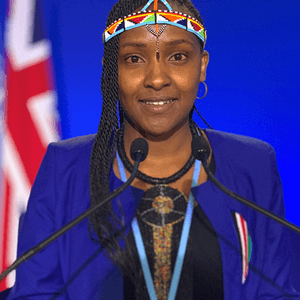

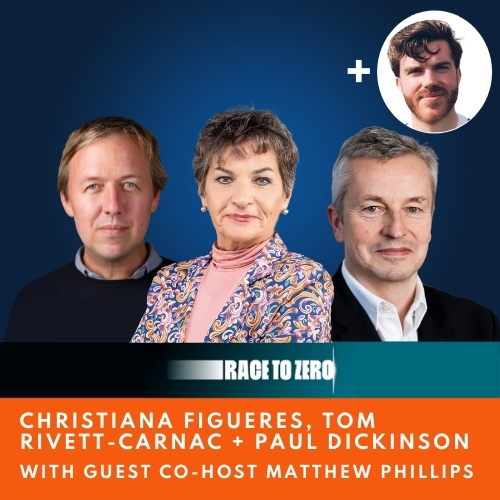
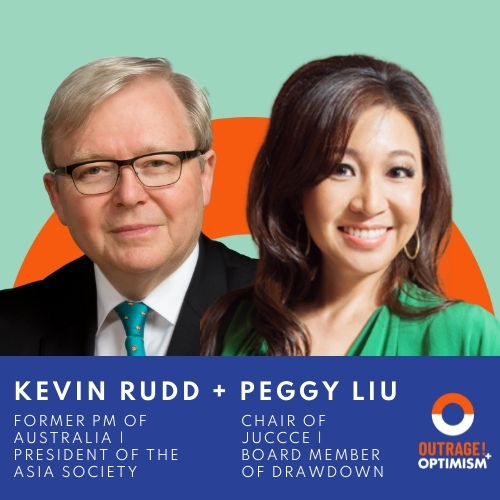
.jpg)
